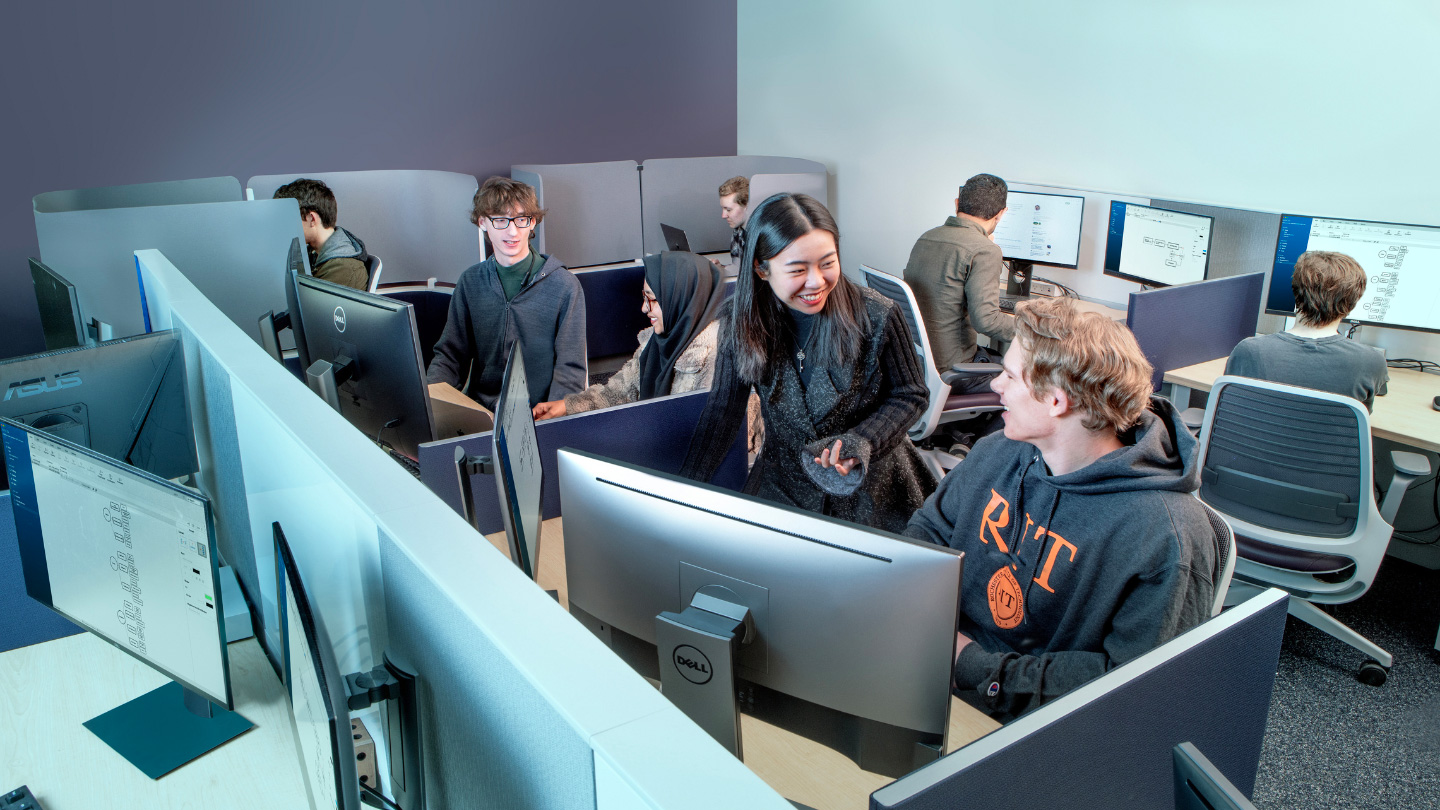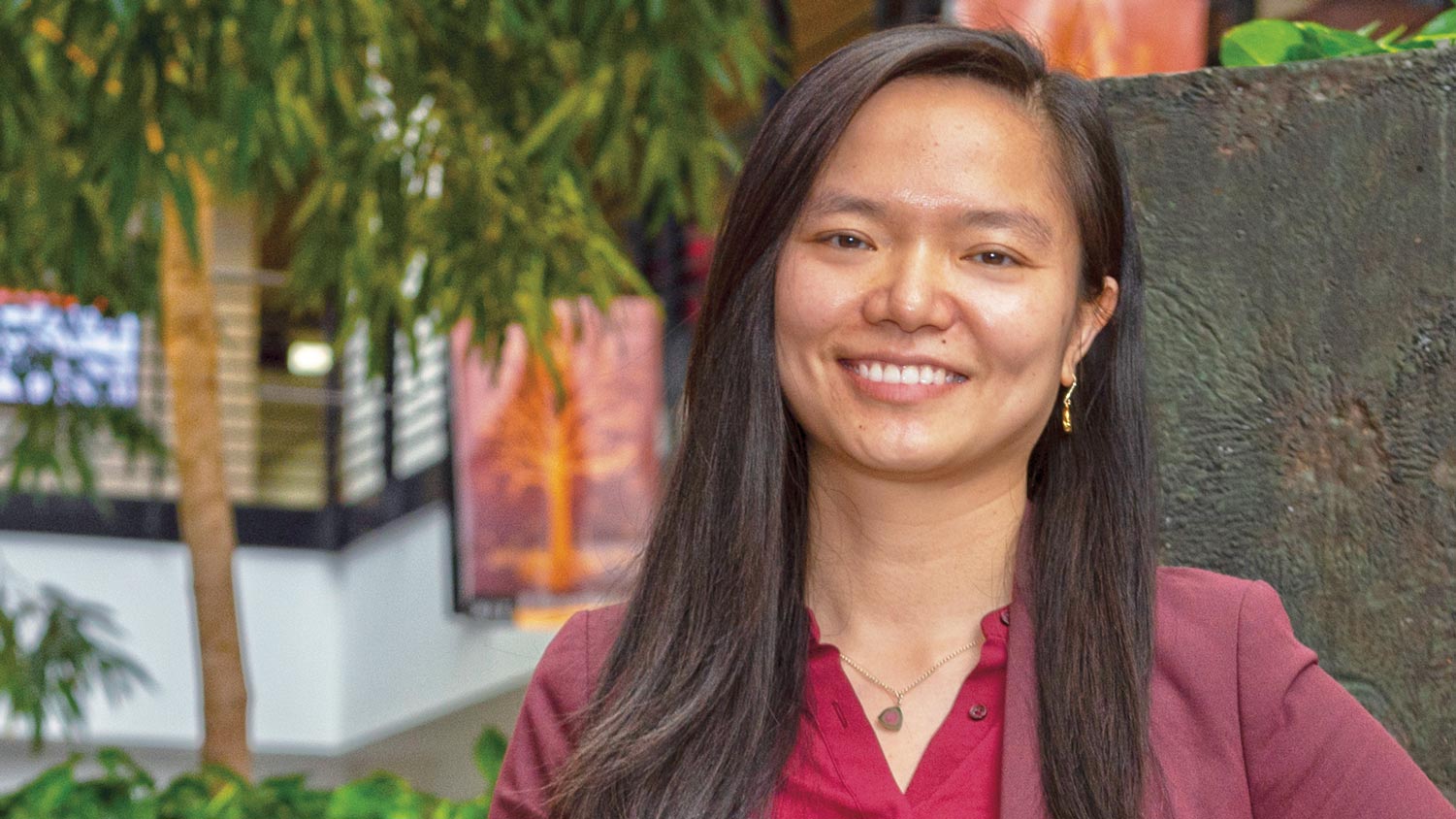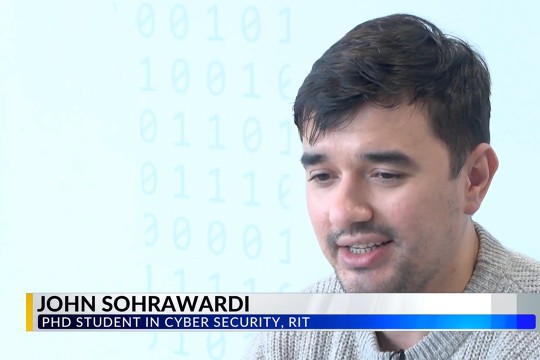Computing and Information Sciences Doctor of Philosophy (Ph.D.) Degree


Computing and Information Sciences
Doctor of Philosophy (Ph.D.) Degree
- RIT /
- Rochester Institute of Technology /
- Academics /
- Computing and Information Sciences Ph.D.
Request Info about graduate study
Visit
Apply
The Ph.D. in computing and information sciences is a research degree that produces independent scholars, cutting-edge researchers, and well-prepared educators. You'll study with RIT's world-class computing faculty and take advantage of diverse academic offerings and modern facilities as you identify and research challenges within and beyond computing.
Overview for Computing and Information Sciences Ph.D.
In the computing and information sciences Ph.D., you will conduct both foundational and applied research to address diverse and important challenges within and beyond computing and benefit from world-class faculty, diverse academic offerings, and modern facilities. Our graduates are poised to excel in both computing and interdisciplinary environments in academia, government, and industry.
The doctoral program highlights two of the most unique characteristics of the Golisano College for Computing and Information Sciences: its breadth of program offerings and its scholarly focus on discovering solutions to real-world problems by balancing theory and practice. The program brings together faculty from disciplines throughout the college’s five departments and schools: Computer Science, Cybersecurity, the School of Information, the School of Interactive Games and Media, and Software Engineering.
The Ph.D. in computing and information sciences focuses on the theoretical and practical aspects of cyberinfrastructure as applied to specific problems across multiple domains. It is a blend of intra-disciplinary computing knowledge areas and inter-disciplinary domain areas.
Cyberinfrastructure
Cyberinfrastructure is the comprehensive integration of hardware, data, networks, and digitally-enabled sensors to provide secure, efficient, reliable, accessible, usable, and interoperable suites of software and middleware services and tools. The doctorate program plays a leadership role in cyberinfrastructure research by providing human-centered tools for the science and engineering communities. These tools and services focus on such areas as high-performance computing, data analysis and visualization, cyber-services and virtual environments, and learning and knowledge management.
Intradisciplinary Knowledge
There are three intradisciplinary computing knowledge areas: infrastructure, interaction, and informatics.
Infrastructure
Infrastructure comprises aspects related to hardware, software (both system software and applications), communications technology, and their integration with computing systems through applications. The focus is on the best organization of these elements to provide optimal architectural solutions. On the hardware side, it includes system-level design (e.g., for system-on-a-chip solutions) and their building block components. On the software side it covers all aspects of systems and applications software development, including specification and design languages and standards; validation and prototyping, and multi-dimensional Quality-of-Service management; software product lines, model-driven architectures, component-based development, and domain-specific languages; and product estimation, tracking, and oversight. The communications subtopic includes sensor networks and protocols; active, wireless, mobile, configurable, and high-speed networks; and network security and privacy, quality of service, reliability, service discovery, and integration and inter-networking across heterogeneous networks. At the system level, there are issues related to conformance and certification; system dependability, fault tolerance, verifiable adaptability, and reconfigurable systems; real-time, self-adaptive, self-organizing, autonomic systems. Some of the specialties available in this area are networks and security, digital systems and VLSI, software design and productivity, and systems software.
Interaction
Interaction refers to topics related to the combined action of two or more entities (human or computational) that affect one another and work together when facilitated by technology. It encompasses several subtopics relating to how people and technology interact and interface. Several common threads weave through all of these areas, many of which rely heavily and build upon foundations in the social and behavioral sciences with an emphasis on understanding human and social/organizational phenomena. To some extent, these fields follow an engineering approach to the design of interactions in which solutions are based on rules and principles derived from research and practice but require analyses that go beyond the analytical approach. From this perspective, solutions can be measured and evaluated against goals and intended outcomes. However, while efficiency and effectiveness are often the watchwords of these fields in practice, this is also where science meets art in computing. Creative design and sensitivity to human needs and aesthetics are critical. Some of the specialties available in this area are human-computer interaction, computer-based instructional systems, and access technologies.
Informatics
Informatics is the study of computational/algorithmic techniques applied to the management and understanding of data-intensive systems. It focuses on the capture, storage, processing, analysis, and interpretation of data. Topics include algorithms, complexity, and discovery informatics. Data storage and processing require investigation into tools and techniques for modeling, storage, and retrieval. Analysis and understanding require the development of tools and techniques for the symbolic modeling, simulation, and visualization of data. The increased complexity of managing vast amounts of data requires a better understanding of the fundamentals of computation. These fundamentals include complexity, theory to determine the inherent limits of computation, communication, cryptography, and the design and analysis of algorithms to obtain optimal solutions within the limits identified. Some of the specialties available in this area are core informatics, discovery informatics, and intelligent systems.
Interdisciplinary Domains
The program focuses on domain-specific computing, or the interaction between computing and non-computing disciplines, in the areas of science, engineering, medicine, arts, humanities, and business. By incorporating domain-specific computing, the research conducted in this program applies computing and information science principles to the solution of problems in application domains that lie outside the scope of the traditional computing discipline. The research requirement incorporates fundamental concepts in cyberinfrastructure that are necessary for understanding the problems commonly encountered in advancing scientific discovery and product development in cross-disciplinary domains.
Active Research Areas
Computing
- Algorithm and theory
- Artificial intelligence and machine learning
- Communication and networking
- Computer vision and pattern recognition
- Data management and analytics
- Education research
- Game design
- Graphics and visualization
- Human-computer interaction
- Natural language processing
- Pervasive and Mobile Computing
- Programming languages
- Security and privacy
- Software engineering
Domain applications
- Accessibility and inclusion
- Biomedical computing
- Cognitive sciences
- Computational astrophysics
- Computational finance
- Geographic information system
- Imaging and image informatics
- Service sciences
- Social computing
RIT’s Ph.D. in Information Science
The Ph.D. in information science requires a minimum of 60 credit hours beyond the baccalaureate level comprised of graduate-level course work, including seminar attendance and research credits. Students complete required foundation and core elective courses and teaching skills courses. Elective courses provide foundation support for the student's dissertation research area. These courses come from cyberinfrastructure courses, domain courses, and other electives.
Dissertation and Research
Students are required to conduct original research that leads to peer-reviewed publications.
Assessments
Each student must pass three assessment examinations in the following order:
1. Research potential assessment: qualifying exam
Completed after the first year, this assessment evaluates the research tasks students have worked on in their first year in the program. Passing this assessment will qualify students to continue in the doctoral program.
2. Thesis proposal defense: candidacy exam
This is an oral examination completed after the thesis proposal is written. Formal admission to candidacy will be granted after successfully passing the research potential assessment requirement and having a research proposal approved by the dissertation committee. The dissertation committee will have a minimum of four members including the student's adviser.
3. Dissertation defense
This is the final examination. The dissertation defense includes the dissertation committee and an optional external reader from outside RIT. The exam consists of a formal, oral presentation of the thesis research by the student, followed by questions from the audience.
Students are also interested in: Computer Science MS, Cybersecurity MS
Join us for Fall 2024
Many programs accept applications on a rolling, space-available basis.
Featured Work
Computing Ph.D. Student Leads Groundbreaking Research with KAIST Interaction Lab
Jiangnan Xu
Jiangnan Xu travels to Korea with the School of Interactive Games and Media to study the intersection of AI and the Metaverse.
Featured Profiles
Blurring the Lines of Artificial Intelligence and Biomedicine Research
Linwei Wang
Linwei Wang, professor of computing and recipient of the Presidential Early Career Award for Scientists and Engineers (PECASE), is using artificial intelligence to advance non-invasive personalized...
Latest News
-
March 21, 2024
![a view from above a computer workstation shows two students working on computers and keyboard]()
RIT game design and development programs ranked among top 10
RIT is one of the top 10 universities for students looking to land their dream job as a game designer, according to new international rankings from The Princeton Review.
-
February 1, 2024
![John Sohrawardi appears on WROC-TV with a chyron displaying his name]()
RIT working on ‘De-Fake’ project to detect what’s real on the internet
WROC-TV talks to John Sohrawardi, a cybersecurity Ph.D. student, about the dangers of deepfake imagery.
-
November 20, 2023
![a hand holding a smart phone displaying the Chat G P T logo.]()
Do your kids cheat on their schoolwork? 13% of teens are using ChatGPT
The New York Post talks to Pengcheng Shi, associate dean for research and scholarship in the Department of Computing and Information Sciences Ph.D., about the use of ChatGPT in the classroom.
Curriculum for 2023-2024 for Computing and Information Sciences Ph.D.
Current Students: See Curriculum Requirements
Computing and Information Sciences, Ph.D. degree, typical course sequence
| Course | Sem. Cr. Hrs. | |
|---|---|---|
| First Year | ||
| CISC-810 | Research Foundations This course provides students with the theoretical background and practical experience with a variety of research techniques and methods. The course provides an overview of the research process along with opportunities for hands-on projects. Major topics for the course include: formulating research questions, conducting literature reviews, selecting appropriate methodologies, data sampling, analyzing statistics, qualitative techniques, technical writing research papers, and presentation skills. (Knowledge in probability and statistics, or permission of instructor) (This course is restricted to students in the COMPIS-PHD program.) Lecture 3 (Fall). |
3 |
| CISC-820 | Quantitative Foundations This course provides an introduction in the fundamentals of working with quantitative information. Topics include matrix algebra (matrices, vectors, direct and indirect methods for solving linear systems, eigenvectors, singular value decomposition, least-squares systems) optimization (convex analysis, gradient descent, Newton's method, interior-point methods), statistics (random variables, p-values, hypothesis testing, confidence intervals) and data exploration (clustering, dimensionality reduction, curve fitting). Note: Knowledge in probability and statistics calculus, and computer programming or permission of instructor is required. (This course is restricted to students in the COMPIS-PHD program.) Lecture 3 (Fall). |
3 |
| CISC-830 | Cyberinfrastructure Foundations Cyberinfrastructure integrates all parts of large-scale computing including a set of software, services, and tools in order to solve large-scale computing problems. This course will give an overview of the problems and solutions of large-scale computing, e.g., Large Hydron Collider. Students will design and develop new tools for cyberinfrastructure. Presentations and written reports are required. Note: Knowledge in data structure and object-oriented design, or permission of instructor is required. (This class is restricted to students in the COMPIS-PHD program.) Lecture 3 (Spring). |
3 |
| CISC-890 | Dissertation and Research Students will perform use-inspired original research in the interaction, informatics, and infrastructure areas of computing and information sciences applied to specific domain(s). Students will receive guidance from their advisor(s) in choosing an appropriate topic and activity. Note: Permission of the Ph.D. Director is required. (Enrollment in this course requires permission from the department offering the course.) Thesis (Fall, Spring, Summer). |
6 |
| CISC-896 | Colloquium in Computing and Information Sciences This course develops the student's knowledge and understanding of various contemporary research issues, especially in the interdisciplinary areas of computing and information sciences. The student will get involved by attending a number of research presentations and discussions. The choice of topics considered may vary and will be determined by the instructor. (This course is restricted to students in the COMPIS-PHD program.) Lecture (Fall, Spring). |
0 |
Infrastructure Elective |
3 | |
Interaction Elective |
3 | |
Informatics Elective |
3 | |
| Second Year | ||
| CISC-807 | Teaching Skills Workshop Teaching is a valuable and desirable skill for PhD students. This workshop course provides an introduction to the concepts and skills needed for quality teaching in higher education. Students will be provided with lecture, reading, and class activities centered on building skills in educational analysis, design, and assessment. Prerequisites: Limited to students in the Ph.D. program. Class 2, Credit 2 (F) (This course is restricted to students in the COMPIS-PHD program.) Lecture 2 (Spring). |
2 |
| CISC-890 | Dissertation and Research Students will perform use-inspired original research in the interaction, informatics, and infrastructure areas of computing and information sciences applied to specific domain(s). Students will receive guidance from their advisor(s) in choosing an appropriate topic and activity. Note: Permission of the Ph.D. Director is required. (Enrollment in this course requires permission from the department offering the course.) Thesis (Fall, Spring, Summer). |
7 |
| CISC-896 | Colloquium in Computing and Information Sciences This course develops the student's knowledge and understanding of various contemporary research issues, especially in the interdisciplinary areas of computing and information sciences. The student will get involved by attending a number of research presentations and discussions. The choice of topics considered may vary and will be determined by the instructor. (This course is restricted to students in the COMPIS-PHD program.) Lecture (Fall, Spring). |
0 |
Electives |
9 | |
| Third Year | ||
| CISC-890 | Dissertation and Research Students will perform use-inspired original research in the interaction, informatics, and infrastructure areas of computing and information sciences applied to specific domain(s). Students will receive guidance from their advisor(s) in choosing an appropriate topic and activity. Note: Permission of the Ph.D. Director is required. (Enrollment in this course requires permission from the department offering the course.) Thesis (Fall, Spring, Summer). |
18 |
| Total Semester Credit Hours | 60 |
|
Admissions and Financial Aid
This program is available on-campus only.
| Offered | Admit Term(s) | Application Deadline | STEM Designated |
|---|---|---|---|
| Full‑time | Fall | December 31 priority deadline, rolling thereafter | Yes |
Full-time study is 9+ semester credit hours. International students requiring a visa to study at the RIT Rochester campus must study full‑time.
Application Details
To be considered for admission to the Computing and Information Sciences Ph.D. program, candidates must fulfill the following requirements:
- Complete an online graduate application.
- Submit copies of official transcript(s) (in English) of all previously completed undergraduate and graduate course work, including any transfer credit earned.
- Hold a baccalaureate degree (or US equivalent) from an accredited university or college. Since the program encompasses a wide variety of disciplines, students with diverse backgrounds (e.g. engineering, science, humanities, fine arts, business, and disciplines with sufficient computing backgrounds) are encouraged to apply.
- A recommended minimum cumulative GPA of 3.0 (or equivalent).
- Submit a current resume or curriculum vitae.
- Submit a statement of purpose for research which will allow the Admissions Committee to learn the most about you as a prospective researcher.
- Submit two letters of recommendation.
- Entrance exam requirements: GRE required. No minimum score requirement.
- Writing samples are optional.
- Submit English language test scores (TOEFL, IELTS, PTE Academic), if required. Details are below.
English Language Test Scores
International applicants whose native language is not English must submit one of the following official English language test scores. Some international applicants may be considered for an English test requirement waiver.
| TOEFL | IELTS | PTE Academic |
|---|---|---|
| 88 | 6.5 | 60 |
International students below the minimum requirement may be considered for conditional admission. Each program requires balanced sub-scores when determining an applicant’s need for additional English language courses.
How to Apply Start or Manage Your Application
Cost and Financial Aid
An RIT graduate degree is an investment with lifelong returns. Ph.D. students typically receive full tuition and an RIT Graduate Assistantship that will consist of a research assistantship (stipend) or a teaching assistantship (salary).
Additional Information
Prerequisites
- Have completed at least one full year of study in programming and computing concepts
- Have a strong mathematical background in subjects such as discrete mathematics and probability and statistics
- Have aptitude, vision, and experience (if applicable) in computing and information sciences-related research
Resources
Here you will find additional resources for the Ph.D. Program in Computing and Information Sciences, such policies, procedures, technical resources, etc.
View resources



















